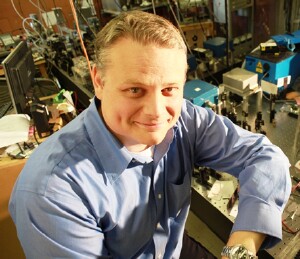Session 07

|
Aaron Slepkov |
Integrated Testlets: How to use multiple-choice structures to both test and form deeper physics knowledge in the classroom and beyond. |
Multiple-choice testing is becoming ever more common in the physics classroom, as instructional resources dwindle
and student populations rise. Multiple choice testing is easy to deploy, reliable, and inexpensive time-wise,
yet there is often a sense that the format is somehow deficient in validity. The knock on multiple choice
testing is that it easily assesses superficial knowledge but hinders assessment of deeper cognitive processes.
Particularly in physics, we would like to find better ways to test deeper levels of understanding or knowledge
integration than is typically afforded by multiple-choice tests. Immediate-feedback assessment tools enable the
development of "integrated testlets"-a group of multiple choice questions that share a common stem but which may
build one upon another to assess higher echelons of learning. Furthermore, the immediate-feedback tool allows for
straightforward (and demonstrably valid) grating of partial credit. With integrated testlets, conceptual
scaffolding is both tested and, if needed, assembled during the assessment. Thus, an integrated testlet
that utilizes immediate feedback serves both summative and formative purposes. |
Biography |
Aaron Slepkov is an Assistant Professor and Canada Research Chair in the Physics of Biomaterials, in the department of physics & astronomy at Trent University. He has broad research interests and expertise in nonlinear photonics, biophysics, and ultrafast laser microscopy. Aaron's interests in physics education research were born in a series of casual graduate-student lunchtime seminars in the physics department of the University of Alberta. Since then, he has devoted increasing amounts of time and anxiety to thinking about why physics is so universally unpopular among students. He has yet to find a satisfying answer to that question. His current PER research deals with classroom assessments and with developing new assessment tools specifically geared to science education. |
| Contact |
| Updated RM February 2, 2015 |